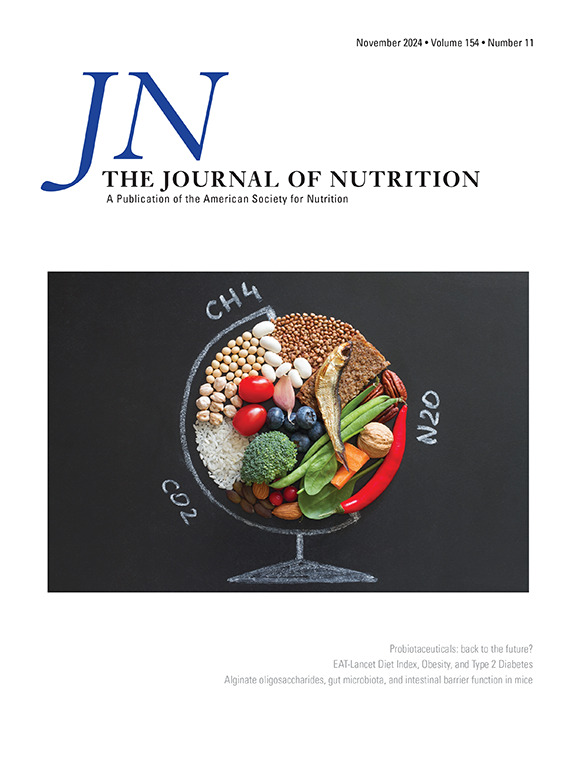肠道能量吸收与年轻健康成人的血糖变异性有关。
IF 3.7
3区 医学
Q2 NUTRITION & DIETETICS
引用次数: 0
摘要
背景:虽然已经确定人类不能100%地从饮食中吸收总能量,但关于肠道能量吸收(即消化率)与代谢健康和胃肠道功能之间的关系,我们知之甚少。目的:这项二级分析的目的是确定能量消化率与心脏代谢健康和胃肠功能标志物之间的关系。方法:16名健康成人进行了为期9天的体重维持控制饮食。在第4-7天,参与者收集了所有的粪便和尿液,用于测量能量和大量营养物质的损失以及消化率(即能量吸收)的测定。通过Pearson和Spearman相关性评估能量消化率、胃肠转运时间和心脏代谢健康结局之间的关系。多变量回归分析用于确定可在实验室收集的变量,并作为能量消化率的替代测量。结果:平均能量消化率为91.7±1.5%,个体消化率为89.7 ~ 94.3%。(r=-0.89, P2=0.95, p)结论:能量消化率是与胃肠道功能和葡萄糖变异性相关的重要生理变量,应在未来的精准营养试验中予以考虑。临床试验注册:该研究已获得佛罗里达州立大学机构审查委员会批准,并在clinicaltrials.gov上注册为NCT04877262 (https://clinicaltrials.gov/study/NCT04877262?id=NCT04877262&rank=1)。本文章由计算机程序翻译,如有差异,请以英文原文为准。
Intestinal Energy Absorption Is Associated with Glycemic Variability in Young, Healthy Adults
Background
Although it is well established that humans are not capable of absorbing 100% of gross energy consumed from the diet, little is known regarding the association between intestinal energy absorption (i.e., digestibility) and metabolic health and gastrointestinal function.
Objectives
The objective of this secondary analysis was to determine associations between energy digestibility and markers of cardiometabolic health and gastrointestinal function.
Methods
Sixteen healthy adults consumed a weight-maintenance controlled diet for 9 d. During days 4–7, participants collected all stool and urine, which allowed for the measurement of energy and macronutrient loss and determination of digestibility (i.e., energy absorption). Relationships between energy digestibility, gastrointestinal transit time, and cardiometabolic health outcomes were assessed by Pearson and Spearman correlations. Multivariable regression analysis was used to identify variables that could be collected in the laboratory and serve as a surrogate measure of energy digestibility.
Results
Mean energy digestibility was 91.7% ± 1.5% with individual digestibility values ranging from 89.7% to 94.3%. Wet (r = –0.89, P < 0.0001) and dry stool weight (r = –0.89, P < 0.0001), gross energy intake (r = –0.53, P = 0.034), and fiber intake (r = –0.53, P = 0.034) were inversely associated with digestibility. Glucose variability (mean amplitude of glycemic excursions; r = 0.68, P = 0.0056), colonic transit time (r = 0.63, P = 0.016), age (r = 0.63, P = 0.0093), and whole-gut transit time ( r = 0.54, P = 0.032) were positively associated with digestibility. Furthermore, in a multiple linear regression model, 95% of the variability in energy digestibility was explained by the dry weight of stool (g/d), 24-h blood glucose variability (mean amplitude of glycemic excursions; mg/dL), colonic transit time (h), whole-gut transit time (h), and age (y; adjusted R2 = 0.95, P < 0.0001).
Conclusions
Energy digestibility is an important physiological variable associated with gastrointestinal function and glucose variability and should be considered in future precision nutrition trials.
Trial registration number
This study was registered at the Florida State University Institutional Review Board and registered on clinicaltrials.gov as registration number NCT04877262 (https://clinicaltrials.gov/study/NCT04877262?id=NCT04877262&rank=1).
求助全文
通过发布文献求助,成功后即可免费获取论文全文。
去求助
来源期刊

Journal of Nutrition
医学-营养学
CiteScore
7.60
自引率
4.80%
发文量
260
审稿时长
39 days
期刊介绍:
The Journal of Nutrition (JN/J Nutr) publishes peer-reviewed original research papers covering all aspects of experimental nutrition in humans and other animal species; special articles such as reviews and biographies of prominent nutrition scientists; and issues, opinions, and commentaries on controversial issues in nutrition. Supplements are frequently published to provide extended discussion of topics of special interest.
 求助内容:
求助内容: 应助结果提醒方式:
应助结果提醒方式:


